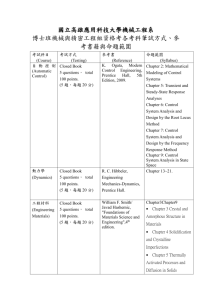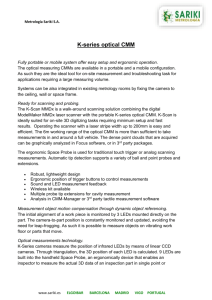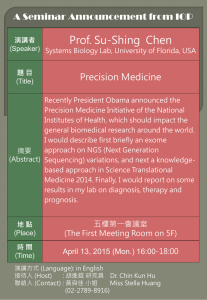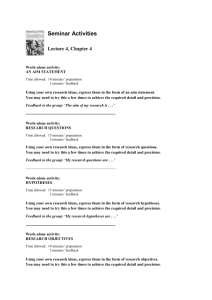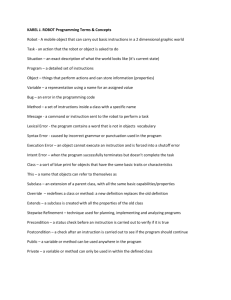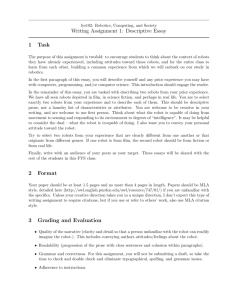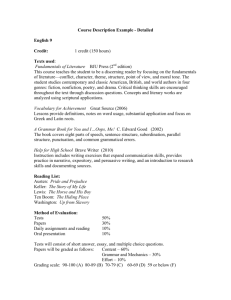Undergraduate Courses
advertisement
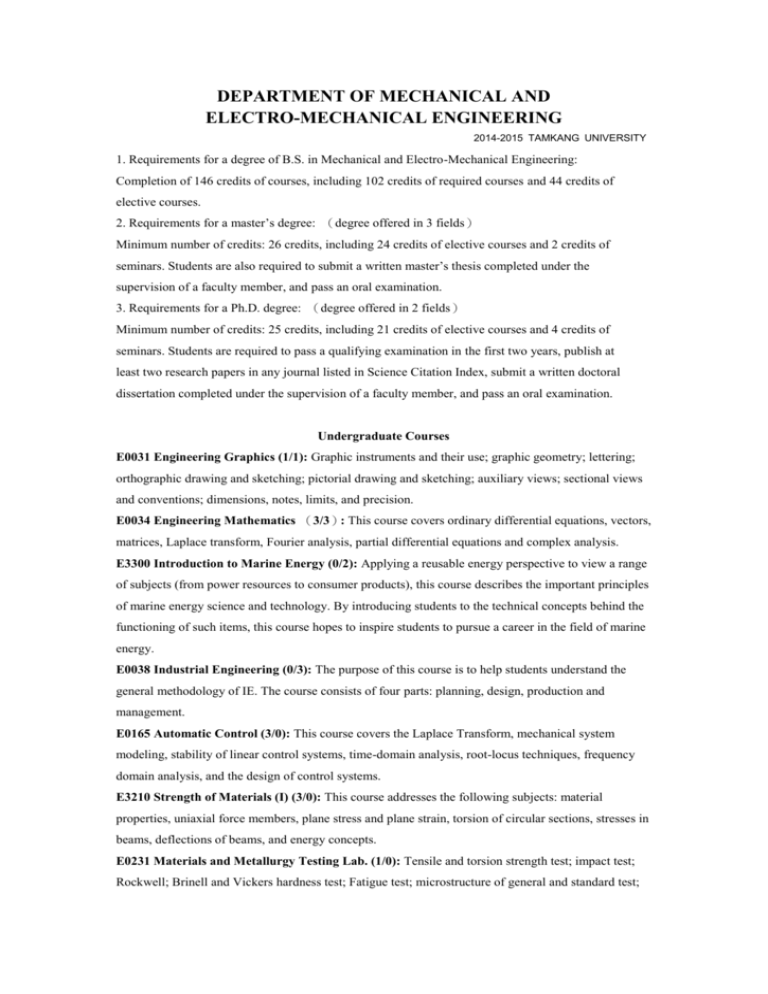
DEPARTMENT OF MECHANICAL AND ELECTRO-MECHANICAL ENGINEERING 2014-2015 TAMKANG UNIVERSITY 1. Requirements for a degree of B.S. in Mechanical and Electro-Mechanical Engineering: Completion of 146 credits of courses, including 102 credits of required courses and 44 credits of elective courses. 2. Requirements for a master’s degree: (degree offered in 3 fields) Minimum number of credits: 26 credits, including 24 credits of elective courses and 2 credits of seminars. Students are also required to submit a written master’s thesis completed under the supervision of a faculty member, and pass an oral examination. 3. Requirements for a Ph.D. degree: (degree offered in 2 fields) Minimum number of credits: 25 credits, including 21 credits of elective courses and 4 credits of seminars. Students are required to pass a qualifying examination in the first two years, publish at least two research papers in any journal listed in Science Citation Index, submit a written doctoral dissertation completed under the supervision of a faculty member, and pass an oral examination. Undergraduate Courses E0031 Engineering Graphics (1/1): Graphic instruments and their use; graphic geometry; lettering; orthographic drawing and sketching; pictorial drawing and sketching; auxiliary views; sectional views and conventions; dimensions, notes, limits, and precision. E0034 Engineering Mathematics (3/3): This course covers ordinary differential equations, vectors, matrices, Laplace transform, Fourier analysis, partial differential equations and complex analysis. E3300 Introduction to Marine Energy (0/2): Applying a reusable energy perspective to view a range of subjects (from power resources to consumer products), this course describes the important principles of marine energy science and technology. By introducing students to the technical concepts behind the functioning of such items, this course hopes to inspire students to pursue a career in the field of marine energy. E0038 Industrial Engineering (0/3): The purpose of this course is to help students understand the general methodology of IE. The course consists of four parts: planning, design, production and management. E0165 Automatic Control (3/0): This course covers the Laplace Transform, mechanical system modeling, stability of linear control systems, time-domain analysis, root-locus techniques, frequency domain analysis, and the design of control systems. E3210 Strength of Materials (I) (3/0): This course addresses the following subjects: material properties, uniaxial force members, plane stress and plane strain, torsion of circular sections, stresses in beams, deflections of beams, and energy concepts. E0231 Materials and Metallurgy Testing Lab. (1/0): Tensile and torsion strength test; impact test; Rockwell; Brinell and Vickers hardness test; Fatigue test; microstructure of general and standard test; taking pictures of test specimens. E0296 Fluid Mechanics Laboratory (0/1): Error estimation; manometers; Pitot tube; Bourden gauge calibration; static water pressure; forced vortex; Reynolds experiment; hydraulic bench; open channel; Venna contracta; impact experiment; Venturi tube; orifice meter; head loss measurement. E0300 Fluid Mechanics (3/0): Dimensional analysis and similitude, internal incompressible viscous flow, external incompressible viscous flow, introduction to compressible flow, steady one-dimensional compressible flow. E0445 Intermediate Dynamics (0/3): Principle of impulse and momentum for three dimensional motion of a rigid body; Euler’s equations of motion; principles of virtual work; Lagrange’s equations of motion; dynamic balancing of rotating machinery. E0629 Microprocessors (0/3): The objective of this course is to introduce the software and hardware architectures of microprocessors. This course covers 8051 hardware, C language, assembly language, I/O interface, and memory systems. E3262 Engineering Applications of Computers (I) (2/0): This course covers methods for solving single-variable equations, interpolation and polynomial approximation, numerical integration and differentiation. E3263 Engineering Applications of Computers (II) (0/2): This course covers methods for solving numerical integration and differentiation, firs order and higher order ODE, and PDE. E3080 Electrical Engineering and Electronics Lab (1/0): This course offers a series of experiments designed to help students learn the basic principles of electronic devices and gain hands-on experience in their applications. E0718 Computer Graphics (0/1): The main purpose of this course is to teach students to use Auto CAD and Microstation to draw both two and three dimensional engineering drawings. E0777 Thermal Engineering Lab (1/0): Steam power plant; heat exchanger; heat conduction unit; thermal conductivity of liquid and gas unit; natural convection; thermal wind tunnel; CPU cooler unit. E0782 Heat Transfer (0/3): This course covers the following subjects: basic modes of heat transfer, conduction, convection, natural convection, forced convection, heat exchangers, radiation, heat transfer with phase change. E0815 Mechanism (0/3): Motion in machinery, velocity and acceleration analysis of mechanisms, transmission of motion, static and dynamic force analysis, balance of inertial forces, dynamic features of machinery. E2886 Robotics (2/0): This course provides students with a basic conception of Robotics. Topics include kinematics and differential kinematics of robots, robot actuators, trajectory planning, robot perception, robot vision, and robot control. The robot systems concerned in this course include wheeled mobile robots and legged mobile robots. E2410 Fundamentals of Mechanical and Electro-Mechanical Engineering (0/1): This is a freshman course designed to introduce basic concepts about mechanical and electro-mechanical engineering to beginning engineering students. E3207 Fundamentals of Precision Machine Elements (2/2): This course provides instruction on the design and application of standard precision machines. In particular, it emphasizes the correctness, accuracy and safety of the resultant design. It also emphasizes the production of creative and reliable designs. It is a fundamental course for modern mechanical system design. E0828 Mechanical Drawing (1/0): This course covers the following subjects: section view; details and assembly drawing; the use of threads, fasteners, keys, rivets and springs; gear and cam; drawing of piping; welding; jigs and fixtures. E0914 Precision Manufacturing Processes (0/3): This course covers fundamentals and applications of various manufacturing processes such as the fundamentals of materials, machining processes, basic metal cutting theory, fundamentals of machine tools, non-traditional machining processes, forming processes, casting processes, joining processes, micro-nano fabrication processes, and automation and quality assurance. E0867 Applied Mechanics (I): (Statics) (0/2): Fundamental principles, statistics of particles, equivalent systems of forces, equilibrium of rigid bodies, centroids and centers of gravity, analysis of structures, forces in beams and cables, friction, moment of inertia, method of virtual work. E0722 Circuit Theory (0/3): This course introduces fundamental principles and analysis methods of electric circuits. The contents contain DC and AC circuits, transient and frequency responses of electric circuits, and AC power. E2235 Computer Program Design (3/0): The purpose of this course is to introduce programming tools commonly used by scientists and engineers. This course includes the following subjects: (1) an introduction to programming; (2) input/output; (3) file processing; (4) decisions and the IF statement; (5) repetition and loops; (6) arrays; (7) functions and subroutines. E2525 Strength of Materials (II) (0/3): The purpose of this course is to (1) teach students how to study mechanics, (2) introduce solutions of simple structures made of linear elastic materials, and (3) introduce failure modes including yielding, fatigue, and buckling. E0868 Applied Mechanics (II): (Dynamics) (3/0): Kinematics of particles, kinetics of particles, Newton’s second law, energy and momentum methods, systems of particles, kinematics of rigid bodies, kinetics of rigid bodies, introduction to mechanical vibration. E0902 Logic Design (3/0): This course covers the number systems and operations, logic gates, Boolean algebra, Karnaugh maps, combinational logic analysis, sequential logic and logic devices. E0961 Electronics (3/0): This course covers semiconductors and diodes, bipolar junction transistors, field-effect transistors and power electronics, operational amplifiers, integrated circuit electronics, digital logic circuits, and digital systems. E1034 Introduction to Computers and Programming (2/2): Information technology, personal productivity tools, hardware and communications, information systems, technological trends, problemsolving with Fortran and other computer-aided devices. E1559 Mechatronics (0/3): This course introduces each part of the control system while integrating the following sections: (1) electromechanical components; (2) interface circuit; (3) mechanical parts; and (4) feedback signal processing. E2067 Control System Design (0/3): This is an advanced level program of automatic control. This course introduces control designs in frequency domain or state space methods. Topics include: frequency response of a linear system, control design by frequency response methods, state variable models, and state feedback control. E2157 Applications of Industrial Materials (3/0): This course is organized into three parts: (1) manufacturing, property and applications of the back light modulus; (2) manufacturing, property and applications of fixable displays; (3) manufacturing, property and applications of optical films; (4) manufacturing, property and applications of white light LED. E3119 Energy and the Environment (0/3): This course introduces the fundamental relationship of energy use and environmental issues, pollution control technologies and waste management strategies, while reviewing the current status of renewable and non-renewable energy sources. The course emphasizes the importance of finding the equilibrium between technology and environmental protection. M0022 Engineering Economics (3/0): This course introduces concepts and theories related to the Engineering Economy. The tools introduced can be used in making decisions, while the areas touched on include the production industry (e.g. IC packing, TFT-LCD, Notebook, machinery and Mechtronics), the bio-tech, and bio-medical industries. Throughout the course, decision making and risk control are studied and practiced. E3403 Mechanism Design (3/0): The purposes of this course are to interest the students in mechanism design, to acquaint the students with techniques for mechanism synthesis, to make students competent to evaluate various mechanisms and to modify them. Topics include classifications of mechanisms, introductions to drivers, synthesis techniques, analytic skills, design evaluation, and case studies. E3404 Advanced Computer Graphics (0/3): This course teaches student how to use the threedimensional computer-aided design software and draft the mechanical elements. The motion and structural simulations will also be exercised. The students will build the three-dimensional models in practice. The rapid prototyping and precise machine design will be achieved. T0994 Key Issues in Career Planning (1/1): The purpose of this course is to help students develop the ability to think logically, and to enhance their problem-solving skills and techniques of expression. Logical thinking is developed by reading technical papers; while problem-solving skills are gained by solving engineering problems. Training in expression is carried out by writing reports. E1108 Workshop Practice (1/1): The first topic discussed is woodworking, the second metal filing, the third metal removal processes—especially in turning—and the final, the welding process. E1903 Analysis of Dynamic Systems (3/0): Topics in this course include: translational and rotational mechanical systems, electrical systems, analytical solution of linear models, Laplace transform and transfer function analysis, electromechanical systems, block diagrams, and computer analysis. E1277 Fundamentals of Mechanical Vibrations (3/0): Dynamics, oscillatory motion, free vibration, energy methods, forced periodic vibration, initial conditions and transient vibration, damping, damped forced vibration, two degrees of freedom, and nonlinear vibration. E3229 History of Fluidic Machine (2/0): This course provides an introduction to the development of machinery throughout human history to inspire and motivate students to pursue further studies in the field of mechanical engineering. E1954 Digital Signal Processing (0/3): The course will cover the concepts of continuous-time sinusoidal signals, discrete-time signals and systems, the frequency spectrum, and filter design. Students will improve their digital application ability in the control field. E3209 Applied Physics (3/0): The course focuses on the application and property of the various classes of physics, Important topics include: electrical, semiconductor physics, superconducting physics, magnetic physics, dielectric, optical physics, modern physics and nano-physics. E3299 Introduction to Optomechatronic Engineering (0/3): This course provides fundamental principles, design guidelines, and system integration techniques of optomechatronic systems. The content contains principles of photonics, principles of optomechanical design, signal processing and system interface techniques. The optomechatronic systems concerned in this course include laser encoders and laser writers. E2291 Microprocessor Applications Lab (0/1): This course conducts a series of application experiments on microprocessors. The applications include timers, counters, serial ports, external memory, and external I/O, ADC, DAC, 8255 interfaces. E3087 History of Machine Science & Technology (2/0): This course provides an introduction to the development of machinery throughout human history to inspire and motivate students to pursue further studies in the field of mechanical engineering. E3088 Materials Science and Engineering (0/3): This course is organized into four parts: part one: Fundamentals; part two: Microstructure Development; part three: Property of Materials; and part four: Materials Synthesis and Design. E3125 Electronic Packaging (0/2): This course provides a practical introduction to the electronic packaging issues of the semiconductor industry. S0434 Engineering Thermodynamics (2/2): Concepts and definitions; properties of a pure substance; work and heat; the first and the second law of thermodynamics; entropy; power and refrigeration cycles; thermodynamics of mixtures; thermodynamic relations; chemical relations; phase and chemical equilibrium. E0158 Introduction to Finite Element Method (0/3): The purpose of this course is to introduce the numerical method to solve practical physical problems. Course content includes the stiffness method, truss element, beam element, frame element, the plane stress and plane strain stiffness equation. E0710 Computer Aided Design (3/0): This class is designed to introduce a person to the fundamentals of PTC’s Pro/ENGINEER software. Topics include sketch module, part module, assembling module, drawing module, mechanism module, and much more. Students will learn how to properly set up CAD projects using Pro/E. The goal of this course is to familiarize engineering students with fundamental principles of computer aided design and perform basic engineering design using solid modeling and parametric design using Pro/E software. At the end of this course, students will have created a project and will better understand CAD office standards. E0715 Computer Aided Manufacturing (0/3): Computer aided manufacturing (CAM) is very important for mold development. This course involves the relationship between the structure, property, and morphology of mold design. The course also provides basic and advanced instruction on tool path programming. Students can anticipate to apply CAM software and to finish their final project. E2040 The Processing Machines of Microchip Fabrication (0/3): This course provides a general understanding of the processing machines of microchip fabrication, involving the system integration of electronics, material science, physics, chemistry, and mechanics. E2238 Applied Design Optimization (3/0): This course details the theory and application of optimization techniques that arise in mechanical engineering design. In addition to the mathematical fundamentals of gradient-base techniques, the major focus of the course is the unconstrained and constrained programming of numerical methods. A well-developed commercial package optimizer is used in the course and is integrated with the user’s simulation program. Several mechanical structural design problems are explored throughout the course. E3298 Surface Engineering of Materials (0/3): This course provides students with basic concepts on physical and chemical properties in material surface treatment. Topics include the principles and technology involved in electroplating, evaporation technology, principles of physical vapor deposition (PVD), principles of chemical vapor deposition (CVD), sputtering plating techniques, the anodized treatment of principle and technology, deposited surface analysis and measurement. E3208 Principle of Precision Machine (3/0): This course aims to introduce the fundamentals and applications of Precision Machine Design. Topics such as Basic Principles of Accuracy, Repeatability and Resolution, Geometric Errors Analysis, System Design Consideration, Machine Structure of Precision Machines, Metrology System in Precision Machines, Sensors & Transducers in Precision Machines will be addressed and discussed. E2222 Fundamentals of Precision Machining (0/3): This course covers fundamentals and applications of precision machining. Topics such as Introduction to Mechanical/Optical Metrology System, Introduction to Precision Machine Tools, Basic Principles of Precision Turning Technology, Basic Principles of Precision Grinding Technology, Basic Principles of Precision Lapping Technology, Introduction to Energy Beam Machining will be addressed and discussed. E3485 Human Factor (3/0): Reducing error and influencing behavior is the key in understanding our approach to human factors. It gives a simple introduction to generic industry guidance on human factors, which it defines as: "Human factors refer to environmental, organizational and job factors, and human and individual characteristics, which influence behavior at work in a way which can affect health and safety" This definition includes three interrelated aspects that must be considered: the job, the individual and the organization. In other words, human factors are concerned with what people are being asked to do (the task and its characteristics), who is doing it (the individual and their competence) and where they are working (the organization and its attributes), all of which are influenced by the wider societal concern, both local and national. Human factors can, and should, be included within a good safety management system and so can be examined in a similar way to any other risk control system. Master’s Program E0156 Finite Element Methods (3/0): This course covers matrix structure analysis of trusses, beams, and frames, energy principles, shape functions, stiffness matrices, load vectors, assembly of system equations, boundary conditions, isoparametric formulation, constraints, axisymmetric problems, plates and shells, and dynamic problems. E0424 Advanced Engineering Mathematics (3/0): Topics include: the method of eigen-function expansion, The Dirac delta function and its relationship to Green’s, Green’s functions for ordinary differential equations, and partial differential equations, calculus of variations, the Rayleigh Ritz Method, the perturbation method, and the similarity method. E0629 Microprocessor (3/0): Objectives of this course include: (1) To teach the architecture of a micro-controller; (2) To show that a micro-controller can be programmed and be useful in everyday applications; (3) To introduce the basics of electronic design by constructing various interfaces of the micro-controller with other devices; and (4) To equip students with basic skills in electronic design and micro-controller programming. E0754 Elasticity (3/0): Stress; strain; compatibility condition; stress-strain relation; displacement formulation and stress formulation of elasticity problems; St. Venant theories of torsion and bending; general curvilinear coordinates; 2-D and 3-D elasticity; Green’s function approach. E0825 Mechanical Vibrations (3/0): This course focuses on the analysis of mechanical system vibrations. Topics will include dynamics of discrete systems, undamped and damped n-degree-of freedom systems, and approximation of continuous systems. E1846 Theory and Applications in Metal Forming (3/0): The purpose of this course is to introduce the theory and applications in metal forming commonly used by scientists and engineers. This course includes the following subjects: (1) The Tensile Test and Basic Material Behavior, (2) Tensors and Matrices, (3) Stress and Strain, (4) Standard Mechanical Principles, (5) Elasticity and Plasticity, and (6) Classical Forming Analysis. E1847 Micro-Electro-Mechanical Systems (3/0): Prof. Chang Liu’s textbook “Foundation of MEMS” (Prentice Hall, 2006) is utilized thoughtfully throughout this course. Sensors and actuators that use electrostatic, thermal, piezoresistive, piezoelectric, and magnetic principles are discussed. Applications to polymer MEMS, Bio MEMS, microfluidics, optical MEMS and RF MEMS are also mentioned. E2063 Ultra-Precision Machining Processes (3/0): This course covers fundamentals and applications of Precision Machining Processes. Topics such as Optical/Mechanical Metrology Systems, Precision Machine Tools, Single Point Diamond Turning, Machining of Aspheric/Diffractive Optical Components, Precision Diamond Grinding, Precision Lapping/Polishing, and Energy Beam Machining Processes will be addressed and discussed. E2124 Engineering Materials (3/0): This course includes seven main sections: structure of materials, properties of materials, metals, non-metallic materials, semiconductors, composites, and material selection. E2245 Digital Control System (3/0): General introduction to digital control systems, z-plane analysis, design of a digital control system, state-space analysis, pole placement and observer design, optimal control, and Kalman filtering theory. E2398 Linear Control Systems (3/0): Review classical control, analysis, design; state space modeling; state equation; transfer function, block diagram; system characteristics; stability; Lyapunov theory; controllability; observability; control design; pole-placement; observer design. E2506 Fundamentals of Robotics (3/0): This course provides students with basic concepts in the field of Robotics. Topics include kinematics and differential kinematics of robots, trajectory planning, robot perception, robot vision, and image processing. The robots studied in this course include industrial manipulators, wheeled mobile robots, and legged mobile robots. E2945 Viscous Fluid Flow (3/0): The contents of the course include the following: vector and tensor calculus, introduction to the continuum fluid, conservation laws, static equilibrium of fluids and interfaces, the navier-stokes equations, unidirectional flows, approximate methods, and laminar boundary layer flows. S0408 Design of Experiments (3/0): Experimental design is a tool that engineers and scientists use for product design and development as well as process development and improvement. The use of experimental design early in the product cycle can substantially reduce development time and cost, leading to processes and products that perform better and are reliable. The topics covered in the course include the simple comparative experiments, the analysis of variance, various factorial designs, fitting regression models, response surface methods and robust parameter designs with the aid of computer software. S0684 Applied Optics (3/0): Nano-optics is the study of optical phenomena and techniques on the nanometer scale; that is, near or beyond the diffraction limit of light. This course covers the following topics: propagation and focusing of optical fields, optical characteristics in nano-scale, nano-scale optical microscopy, near-field optical probes, photonic crystals, surface plasmons and examples in applied nano-optics. T1433 Research Method (I) (1/0): This course offers lectures on various subjects of mechanical and electro-mechanical engineering. The speakers are invited from industry, university, and related research institutes. Students will be encouraged to engage in discussion and will be required to hand in one report for each lecture. E0445 Advanced Dynamics (0/3): Angular velocities and accelerations in moving reference frames; Eulerian angles and Euler parameters; constraints; Newtonian kinetics; energy principles; Lagrange’s equations; constrained systems; multibody systems; modeling of dynamic systems. E0480 Control Theory (0/3): This course offers a review of various topics in undergraduate control courses, topics in recently developed control theory, including analysis of control systems in statespace and design of control systems by using state-space methods. E1389 Intelligent Control (0/3): This course will introduce the theory of intelligent control. It will also explore differences between theory and practice in this area so as to enhance students’ ability to make decisions. E1991 Vibration Control of Mechanical Systems (0/3): This course provides concepts and analytical methods for the vibration control of mechanical systems. A review of free and force vibrations of mechanical systems, both un-damped and damped, sensors, actuators, passive control, active control adaptive control, and case studies will be covered in this course. E2463 Robot Control (0/3): This course covers some advanced topics in mobile robot navigation, including estimation methods, mobile robot localization, simultaneous localization and mapping (SLAM), moving object tracking (MOT), and data association. Students are required to read papers, do one small project, and make a class presentation. E2505 The Design of a Nano-Material Applied Bio-Chip (0/3): This course intends to develop students’ ability in biochip design with nano-materials. Current issues related to biomedical engineering will be mentioned. The type, the characteristics, and the present status of 4 ene chip, protein chip, DDS chip and Lab on a chip will be introduced. The types, properties and applications of nano-materials will also be discussed. E2626 Fundamental Properties of Materials (0/3): This course is organized into two parts: (1) Engineering properties of various classes of materials. Important topics include: mechanical properties, electrical properties, optical and dielectric properties, magnetic properties, thermal properties; (2) Interactions between the environment and properties of materials. Important topics include: liquid-solid reactions, gas-solid reactions, solid-solid reactions and radiation damage. E2947 Principles of Engineering Metrology (0/3): This course covers fundamentals and applications of engineering metrology. Topics such as dimensional metrology, uncertainty analysis, optical metrology, surface metrology, machine tool metrology, interferometers, image analysis / fringe analysis, and diffraction / photoelectric detectors will be addressed and discussed. E3000 Optomechatronic System Design and Integration (0/3): This course covers fundamentals of optics; machine vision; mechatronic elements for optomechatronic interfaces; optomechatronic integration; basic optomechatronic functional units; and optomechatronic systems in practice. T1111 Research Method (II) (0/1): This course provides students with lectures on the various subjects of mechanical and electro-mechanical engineering. The speakers are invited from industry, universities, and related research institutes. Students will be encouraged to engage in discussion and will be required to hand in one report for each lecture. E2886 Robotics (3/0):This course provides students with basic concepts in the field of robotics. Topics include robot kinematics, trajectory planning, robot perception, and robot navigation. The robots studied in this course include wheeled mobile robots, legged mobile robots, and industrial manipulators. E3439 Visual Measurement And Estimation (0/2): This course covers some fundamental topics in robot visual measurement and estimation, including deterministic measurement methods, visual odometry, uncertainty in robotics, estimation methods, mobile robot localization, image features and data association, and simultaneous localization and mapping (SLAM). Students are requested to read papers, do three small projects, and present in the class. Ph.D. Program E1778 Technical Writing (I) (2/0): This course offers an introduction to general English technical writing. It involves instruction in correct formats and suitable expressions. Course requirements include in-class and homework writing tasks, as well as discussions, to improve students’ capability in English technical writing and expression. E2984 Flapping Flight (3/0): This course provides a general introduction to flapping science and technology, from its theoretical background to hands-on work. E3236 Numerical Model Edifice for Ultra-low Speed Bio-Flow Fields (2/0): Biomedical technology is one of the major fields of the 21st century. It has contributed greatly to research in the areas of genes, proteins, drugs, and even anti-aging. It has also assisted research into the development of bio-chips. Creating bio-chips involves designing micro-channels and analyzing flow-fields. The aim of this course is to train students in constructing numerical models to simulate flow-fields in micro-channels. E3237 Materials Design (3/0): This course is organized into three parts:(1) Design, manufacturing, property and applications of energy-saving materials; (2) Design, manufacturing, property and applications of reversible chromatic materials; and (3) Design, manufacturing, property and applications of thermoelectric materials. E3327 Fuel Cell Fundamentals (3/0): Fuel cell thermodynamics; fuel cell reaction kinetics (activation overpotential); fuel cell charge transport (ohmic overpotential); fuel cell mass transport (concentration overpotential); fuel crossover in fuel cells of low temperature; fuel cell efficiency; fuel cell characterization; modeling and performance indices; semi-empirical model and parameter fitting; fuel cell systems. T0095 Seminar (I) (1/0): This course aims to strengthen students’ critical thinking and problem solving skills in the specific areas of mechanical and electromechanical engineering. Course content includes information retrieval, reading and commenting on specific topics, building a research tree, oral presentations, and technical manuscript writing. T1002 Seminar (III) (1/0): This course aims to strengthen students’ critical thinking and problem solving skills in the specific areas of mechanical and electromechanical engineering. Course content includes information retrieval, reading and commenting on specific topics, building a research tree, oral presentations, and technical manuscript writing. E0002 Two Phase Flow (0/3): Participants in this course will gain a phenomenological understanding of two-phase flow and heat transfer in engineering processes and components, as well as an ability to compute flow and heat transfer in common situations. It approaches two-phase flow and heat transfer in a practical, qualitative way rather than as a graduate level treatment with complex calculations and abstract situations. Basic quantitative calculations, including making sense of the myriad correlations that are given in texts and papers, will also be covered. E1779 Technical Writing (II) (0/2): This course offers an introduction to general English technical writing, including correct formats and suitable expressions. Course requirements include in-class and homework writing tasks, as well as discussions, to improve students’ proficiency in English technical writing and expression. E2711 Numerical Simulation for Ultra-Low Speed Bio-Flow Fields (0/3): Biomedical technology is one of the major fields of the 21st century. It has contributed greatly to research in the areas of genes, proteins, drugs, and even anti-aging. It has also assisted research into the development of bio-chips. Creating bio-chips involves designing micro-channels and analyzing flow-fields. The aim of this course is to train students in constructing numerical models to simulate flow-fields in micro-channels. E2937 Advanced Energy and Environment Control (0/2): This course offers the most up-to-date and relevant knowledge on environment and energy subjects from world-wide sources. It is designed to lead graduate students to understand, analyze, and discuss the most important environmental issues impacting our lives. E2938 Advanced Energy Conversion (0/3): This course covers fundamentals of thermodynamics, flow and transport processes as applied to energy systems. Topics include analysis of energy conversion in thermomechanical, electrochemical, and photoelectric processes in existing and future power and transportation systems, with emphasis on efficiency, environmental impact, and performance. Applications include Concentrated Solar Power Stirling Engine Generation Systems, Thermal Storage Systems, fuel cells and batteries, and so on. E3043 Advanced Engineering Optimization (0/3): This course offers a continuing study of the fundamental principle of optimization that extends its further methodological and technical endeavors in various forms of optimization problems and multidisciplinary design optimization. Specific topics include mixed discrete variables, multiobjective optimization, fuzzy optimization, the approximation method, reliability-based design optimization, structural shape and topology optimization as well as related engineering applications. E3101 Special Topics on Micro Aerial Vehicles (0/3): This course provides a general introduction to MAV technology, from its theoretical background to hands-on work involving flapping MAV “Golden-Snitch”. E3193 Computational Multi-Phase Fluid Dynamics (0/3): In the field of fluid mechanics, multiphase flow is a generalization of the modeling used in two-phase flow to cases where the two phases are not chemically related (e.g. dusty gases) or where more than two phases are present (e.g. in modeling of propagating steam explosions). T0096 Seminar (II) (0/1): This course aims to strengthen students’ critical thinking and problem solving skills in the specific areas of mechanical and electromechanical engineering. Course content includes information retrieval, reading and commenting on specific topics, building a research tree, oral presentations, and technical manuscript writing. T1003 Seminar (IV) (0/1): This course aims to strengthen students’ critical thinking and problem solving skills in the specific areas of mechanical and electromechanical engineering. Course content includes information retrieval, reading and commenting on specific topics, building a research tree, oral presentations, and technical manuscript writing. E3376 Fuel Cell Modeling and Characterization (3/0): Modeling and simulation of a variety of overpotentials and performance indices are conducted in this course, as well as diagnosis and characterization of a fuel cell system. The following topics will be introduced in the course: fuel cell thermodynamics and efficiency, reaction kinetics, charge transport, mass transport, fuel crossover in fuel cells of low temperature, fuel cell characterization and performance evaluation, polarization modeling, fuel permeation modeling, efficiency modeling, semi-empirical approach, and optimal control strategies. E3375 Science and Engineering of Thin Films (0/3) :This course firstly introduces vacuum technology and kinetics of surface processes. The major content includes the vapor deposition processes, PVD and CVD, and film formation and structure. The methods of characterization of thin film will be briefly introduced. To take this course, students are required to have some background on Materials Science and in Thermodynamics of Materials. E3380 Material Physicas (0/3): The course focuses on the application and property of the various classes of physics. Important topics include: electrical physics, semiconductor physics, superconducting physics, magnetic physics, dielectric, optical physics and application, modern physics and nano-physics. E3440 Ecological Sciences (2/0): To teach students to learn and research the interaction and influence among ecology, energy, environment, economics and ordinary living. To use practical subjects, using Considerations of technology and from the directions of overall benefits to the society to guide the students understand the importance of cooperation and mutual accommodation. E3441 Functional Thin Film Processing (0/3): Functional thin film processes are crucial in understanding current and future electronic, magnetic, optical and chemical devices. This course covers the experimental and theoretical understanding of surface and functional thin film processes. Functional thin film processing services apply very thin layers of specialized materials to part surfaces. They perform processes such chemical vapor deposition (CVD), physical vapor deposition (PVD), ion implantation, electrochemical deposition (ECD), plasma etching, rapid thermal processing (RTP), and titanium nitride coating. E3442 Optical Scattering and Photonics (0/3) :Polarization-sensitive light-scattering measurements have the potential for providing a novel class of instrumentation for optical inspection and processcontrol applications both in and out of the optics industry. This course covers the following topics: introduction of optical scattering, scatter calculations and diffraction theory, electron-photon interaction, scatter measurements and instrumentation, detection of surface and subsurface defects, and industrial applications.
